Fleurs du Mal Magazine


Or see the index
English poet Estill Pollock’s new collection is an ARK built to weather the flood of 21st century life.
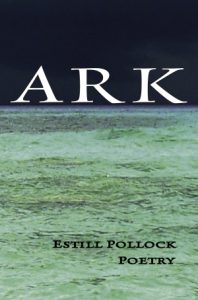 “I have nothing left / To offer, except this poem,” Estill Pollock declares around the midpoint of his new collection ARK, and for anyone else this might seem an apology or lament; but Pollock’s poems encompass multitudes, and offer the reader entire worlds. His title of course suggests both a means of safety and sanctuary (the title of one section here), as well as a repository of sacred texts, and both are apt descriptions for this volume.
“I have nothing left / To offer, except this poem,” Estill Pollock declares around the midpoint of his new collection ARK, and for anyone else this might seem an apology or lament; but Pollock’s poems encompass multitudes, and offer the reader entire worlds. His title of course suggests both a means of safety and sanctuary (the title of one section here), as well as a repository of sacred texts, and both are apt descriptions for this volume.
His hierophantic language demands much from the reader, but rewards in equal measure, and pleasure. His scope ranges over time and space, “in data streams / Of stars,” from “Neanderthals in Paris” to “AI execution codes” and “Cryptocurrency blockchain” carrying us over rising tides of (literal) water and war and all manner of floods that threaten to engulf us. A long account of “London in those times / Of empire” makes up much of the middle section; and even though it has been decades since he left his native America he devotes specific attention to its problematic history, and present. “Mason-Dixon” recounts the Original Sin of slavery, while more recently he observes how “American democracy eats / Its young—pockets emptied to Big Pharma / Big Banks, murder-cop trials, neo-Nazi podcast / Or demagogue variant QAnon.”
“Old worlds give up their dead,” he observes, “a skull / In tidal mud, looted barrows, souvenirs / Of species an archived fidelity, as though / We were disappearing from our own lives.” But Pollock’s ARK is here to preserve us. “This is about everything, and nothing” – in which respect it perfectly resembles life.
Estill Pollock’s publications include Constructing the Human (Poetry Salzburg, 2001) and the book cycle Relic Environments Trilogy (Cinnamon Press, Wales, 2012). His recent poetry collections, ENTROPY (2021) and TIME SIGNATURES (2022), are published by Broadstone Books. He lives in Norfolk, England.
Ark
by Estill Pollock
Pub Date: 8/15/2023
Publisher: Broadstone Books
ISBN 978-1-956782-43-1
Binding: PAPERBACK
Pages: 92
Price: $ 26.00
• fleursdumal.nl magazine
More in: #Editors Choice Archiv, - Book News, - Bookstores, Archive O-P, Archive O-P
Finalist for the 2023 Pulitzer Prize Listed in The Boston Globe’s Best Poetry Books of 2022.
Longlisted for the PEN/Voelcker Award in PoetryAmerican Book Award-winning poet dg okpik’s second collection of poems, Blood Snow, tells a continuum story of a homeland under erasure, in an ethos of erosion, in a multitude of encroaching methane, ice floe, and rising temperatures.
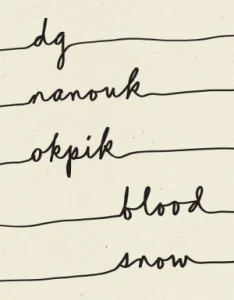 Here, in a true Inupiaq voice, dg okpik’s relationship to language is an access point for understanding larger kinships between animals, peoples, traditions, histories, ancestries, and identities.
Here, in a true Inupiaq voice, dg okpik’s relationship to language is an access point for understanding larger kinships between animals, peoples, traditions, histories, ancestries, and identities.
Through an animist process of transfiguration into a Shaman’s omniscient voice, we are greeted with a destabilizing grammar of selfhood. Okpik’s poems have a fraught relationship to her former home in Anchorage, Alaska, a place of unparalleled natural beauty and a traumatic site of devastation for Alaskan native nations and landscapes alike. In this way, okpik’s poetry speaks to the dualistic nature of reality and how one’s existence in the world simultaneously shapes and is shaped by its environs.
dg nanouk okpik was born and spent much of her life in Anchorage, Alaska. She graduated from Salish Kootenai College with an AFA in Liberal Arts and Liberal Studies, and later attended the Institute of American Indian Arts, graduating with an AFA and a BFA in Creative Writing before receiving her MFA in Creative Writing from Stonecoast College. okpik has won the Truman Capote Literary Award, the May Sarton Award, and an American Book Award for her first book, Corpse Whale (University of Arizona Press, 2012).
Blood Snow
by Dg Nanouk Okpik
Publisher: Wave Books
Publish Date: October 18, 2022
Pages 96
Language: English
Paperback
EAN/UPC: 9781950268634
BISAC Categories:
Native American
Women Authors
Price $18.00
• fleursdumal.nl magazine
More in: #Archive Native American Library, #Editors Choice Archiv, #Modern Poetry Archive, - Book News, - Bookstores, Archive O-P, Archive O-P
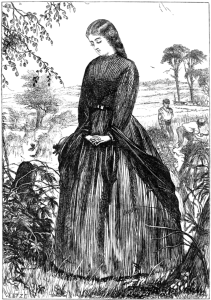
The Seasons
Spring—and her heart is singing
A song full of joyous cheer;
For each brightening day seems bringing
The hope of her life more near.
Summer—her heart is waiting;
Its dream is yet unfulfilled:
But her trust knows no abating,
Though the Spring’s glad song is stilled.
Autumn—her heart is burning
With the fever of restless fears;
And the darkened days returning
Bring her no relief save tears.
Winter—her heart is broken:
The struggles of Hope are o’er;
But the love that was here unspoken
Will be hers where hearts bleed no more.
Evelyn Forest
(Pen name of Anne Pares)
(? – ?)
The Seasons (1862-63)
Illustration: Frederick Eltze (1836–1870)
• fleursdumal.nl magazine
More in: # Classic Poetry Archive, Archive E-F, Archive E-F, Archive O-P, Archive O-P, Natural history

Song
What can it mean?—that glance so tender,
Out of the depths of two soft dark eyes;
Can it be earnest of heart-surrender,
Making me blest with a sweet surprise?
What can it mean?—white hands caressing
Between them a hand that is scarred and brown:
Is it a dream?—two soft lips pressing
That hard rough hand while the tears fall down.
What can it mean?—you kneel beside me,
Laying your dear head upon my breast,
Giving me all that you once denied me!
Is it, sweetheart, is it love confessed?
Evelyn Forest
(Pen name of Anne Pares)
( …-… unknown)
Song
Illustration: Frederick Eltze (1836–1870)
• fleursdumal.nl magazine
More in: # Classic Poetry Archive, Archive E-F, Archive E-F, Archive O-P, Archive O-P
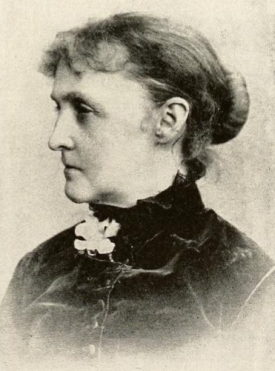
The Palace-Burner
A picture in a newspaper
She has been burning palaces. “To see
The sparks look pretty in the wind?” Well, yes—
And something more. But women brave as she
Leave much for cowards, such as I, to guess.
But this is old, so old that everything
Is ashes here—the woman and the rest.
Two years are—oh! so long. Now you may bring
Some newer pictures. You like this one best?
You wish that you had lived in Paris then?
You would have loved to burn a palace, too?
But they had guns in France, and Christian men
Shot wicked little Communists like you.
You would have burned the palace?—Just because
You did not live in it yourself! Oh! why
Have I not taught you to respect the laws?
You would have burned the palace—would not I?
Would I? Go to your play. Would I, indeed?
I? Does the boy not know my soul to be
Languid and worldly, with a dainty need
For light and music? Yet he questions me.
Can he have seen my soul more near than I?
Ah! in the dusk and distance sweet she seems,
With lips to kiss away a baby’s cry,
Hands fit for flowers, and eyes for tears and dreams.
Can he have seen my soul? And could she wear
Such utter life upon a dying face:
Such unappealing, beautiful despair:
Such garments— soon to be a shroud—with grace?
Has she a charm so calm that it could breathe
In damp, low places till some frightened hour;
Then start, like a fair, subtle snake, and wreathe
A stinging poison with shadowy power?
Would I burn palaces? The child has seen
In this fierce creature of the Commune here,
So bright with bitterness and so serene,
A being finer than my soul, I fear.
Sarah Morgan Bryan Piatt
1836–1919
The Palace-Burner
A picture in a newspaper
Poem
• fleursdumal.nl magazine
More in: # Classic Poetry Archive, #Editors Choice Archiv, Archive O-P, Archive O-P, Photography
Genesis P-Orridge, the mind and voice behind Psychic TV, Throbbing Gristle and COUM Transmissions, began their artistic journey in the 1960’s writing poetry.
Heartworm Press is proud to present hundreds of never before seen or published poems by this legendary, influential original.
Genesis P-Orridge, the mind and voice behind Psychic TV, Throbbing Gristle and COUM Transmissions, began their artistic journey in the 1960’s writing poetry.
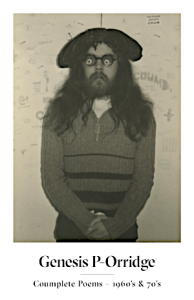 This collection introduces Genesis as a thoughtful innovator and irreverent provocateur with over two decades of poetry, from beat to concrete, and shows the progression of the self, beginning the book under the given name of Neil Megson and eventually growing into the enigmatic Genesis P-Orridge.
This collection introduces Genesis as a thoughtful innovator and irreverent provocateur with over two decades of poetry, from beat to concrete, and shows the progression of the self, beginning the book under the given name of Neil Megson and eventually growing into the enigmatic Genesis P-Orridge.
Heartworm Press is proud to present hundreds of never before seen or published poems including 50 images with an intro by friend and collaborator Wesley Eisold.
Genesis P-Orridge (1950 – 2020) was a singer-songwriter, musician, poet, performance artist, and occultist who rose to notability as the founder of the COUM Transmissions artistic collective and lead vocalist of seminal industrial band Throbbing Gristle. P-Orridge was also a founding member of Thee Temple ov Psychick Youth occult group, and fronted the experimental band Psychic TV.
Coumplete Poems – 1960’s & 70’s
by Genesis P-Orridge
Pub Date: 05/01/2023
Publisher: Heartworm Press
ISBN 979-8-9859385-2-4
SKU#: D19A
Binding: Paperback
Pages:212
Price: $ 28.00
• fleursdumal.nl magazine
More in: #Editors Choice Archiv, - Book News, - Bookstores, Archive O-P, Archive O-P, AUDIO, CINEMA, RADIO & TV, Performing arts
A self-proclaimed “vessel in which stories are told from time immemorial,” poet dg nanouk okpik seamlessly melds both traditional and contemporary narrative, setting her apart from her peers.
 The result is a collection of poems that are steeped in the perspective of an Inuit of the twenty-first century—a perspective that is fresh, vibrant, and rarely seen in contemporary poetics.
The result is a collection of poems that are steeped in the perspective of an Inuit of the twenty-first century—a perspective that is fresh, vibrant, and rarely seen in contemporary poetics.
Fearless in her craft, okpik brings an experimental, yet poignant, hybrid aesthetic to her first book, making it truly one of a kind.
“It takes all of us seeing, hearing, touching, tasting, and smelling to be one,” she says, embodying these words in her work.
Every sense is amplified as the poems, carefully arranged, pull the reader into their worlds. While each poem stands on its own, they flow together throughout the collection into a single cohesive body.
The book quickly sets up its own rhythms, moving the reader through interior and exterior landscapes, dark and light, and other spaces both ecological and spiritual.
These narrative, and often visionary, poems let the lives of animal species and the power of natural processes weave into the human psyche, and vice versa.
Okpik’s descriptive rhythms ground the reader in movement and music that transcend everyday logic and open up our hearts to the richness of meaning available in the interior and exterior worlds.
dg nanouk okpik is a resident advisor at Santa Fe Indian School in New Mexico. Her poetry appears in the books Effigies: An Anthology of New Indigenous Writing, and Sing: Poetry from the Indigenous Americas.
Corpse Whale
by dg nanouk okpik
Publisher: University of Arizona Press
Series: Sun Tracks
Publication Date: October 11th, 2012
Language: English
Paperback
Pages: 112
ISBN: 9780816526741
ISBN-10: 0816526745
$16.95
• fleursdumal.nl magazine
More in: - Book News, - Bookstores, Archive O-P, Archive O-P, Natural history
The extraordinary true story of the Stasi’s poetry club: Stasiland
 East Germany’s secret police were convinced that writers were embedding messages in their work.
East Germany’s secret police were convinced that writers were embedding messages in their work.
This reveals how soldiers had monthly meetings to learn how to write lyrical verse, weaponising poetry in the struggle against the class enemy.
A literary detective story with spies who were moulded into poets; poets who spied on fellow writers.
Philip Oltermann grew up in Schleswig-Holstein and studied English and German literature at Oxford University and University College London.
As a journalist he has written for Granta, the LRB and the Guardian, for whom he is the Berlin Bureau Chief.
The Stasi Poetry Circle (Hardback)
Philip Oltermann
Publ: Faber & Faber
Date Published 17.02.2022
ISBN: 9780571331192
Hardcover
Price £14.99
• fleursdumal.nl magazine
More in: #Editors Choice Archiv, - Book News, - Bookstores, Archive O-P, Archive O-P, REPRESSION OF WRITERS, JOURNALISTS & ARTISTS

Avondgeluiden
Er moeten witte hoeven achter de zoom staan
van de blauwe velden langs de maan
‘s avonds hoort gij aan de verre steenwegen
paardehoeven
dan hoort gij alles stille waan
van verre maanfonteinen zijpelt plots water
– gij hoort plots het zijpelen
van avondlik water –
de paarden drinken haastig
en hinniken
dan hoort men weer hun draven stalwaarts
.
Paul van Ostaijen
(1896 – 1928)
Avondgeluiden
• fleursdumal.nl magazine
More in: Archive O-P, Archive O-P, Expressionism, Expressionisme, Ostaijen, Paul van, Paul van Ostaijen, Paul van Ostaijen
Melodrama, biography, cold war thriller, drug memoir, essay in fragments, mystery – Fassbinder Thousands of Mirrors is cult critic Ian Penman’s long awaited first original book, a kaleidoscopic study of the late West German filmmaker Rainer Werner Fassbinder (1945–1982).
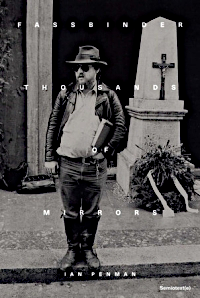 Written quickly under a self-imposed deadline in the spirit of Fassbinder himself, who would often get films made in a matter of weeks or months, Fassbinder Thousands of Mirrors presents the filmmaker as a pivotal figure in the late 1970s moment between late modernism and the advent of postmodernism and the digital revolution.
Written quickly under a self-imposed deadline in the spirit of Fassbinder himself, who would often get films made in a matter of weeks or months, Fassbinder Thousands of Mirrors presents the filmmaker as a pivotal figure in the late 1970s moment between late modernism and the advent of postmodernism and the digital revolution.
Compelling, beautifully written and genuinely moving, echoing the fragmentary and reflective works of writers like Barthes and Cioran, this is a story that has everything: sex, drugs, art, the city, cinema and revolution.
Ian Penman is a British writer, music journalist, and critic. He began his career at the NME in 1977, later contributing to various publications including The Face, Arena, Tatler, Uncut, Sight & Sound, The Wire, the Guardian, the London Review of Books, and City Journal. He is the author of the collections Vital Signs: Music, Movies, and Other Manias (Serpent’s Tail, 1998) and It Gets Me Home, This Curving Track (Fitzcarraldo Editions, 2019). Fassbinder Thousands of Mirrors is his first original book.
Fassbinder Thousands of Mirrors
by Ian Penman
Published by Semiotext(e)
ISBN: 9781635901887
Published: May 02, 2023
Paperback
200 pages
$16.95
• fleursdumal.nl magazine
More in: #Biography Archives, - Book News, - Bookstores, Archive O-P, Rainer Werner Fassbinder
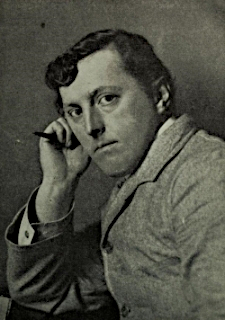
To a Lost Love
I cannot look upon thy grave,
Though there the rose is sweet:
Better to hear the long wave wash
These wastes about my feet!
Shall I take comfort? Dost thou live
A spirit, though afar,
With a deep hush about thee, like
The stillness round a star?
Oh, thou art cold! In that high sphere
Thou art a thing apart,
Losing in saner happiness
This madness of the heart.
And yet, at times, thou still shalt feel
A passing breath, a pain;
Disturb’d, as though a door in heaven
Had oped and closed again.
And thou shalt shiver, while the hymns,
The solemn hymns, shall cease;
A moment half remember me:
Then turn away to peace.
But oh, for evermore thy look,
Thy laugh, thy charm, thy tone,
Thy sweet and wayward earthliness,
Dear trivial things, are gone!
Therefore I look not on thy grave,
Though there the rose is sweet;
But rather hear the loud wave wash
These wastes about my feet.
Stephen Phillips
(1864 – 1915)
To a Lost Love
• fleursdumal.nl magazine
More in: #Editors Choice Archiv, Archive O-P, Archive O-P
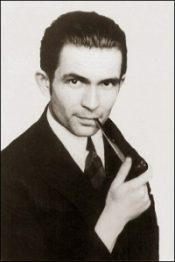
Melopee
Voor Gaston Burssens
Onder de maan schuift de lange rivier
Over de lange rivier schuift moede de maan
Onder de maan op de lange rivier schuift de kano naar zee
Langs het hoogriet
langs de laagwei
schuift de kano naar zee
schuift met de schuivende maan de kano naar zee
Zo zijn ze gezellen naar zee de kano de maan en de man
Waarom schuiven de maan en de man getweeën gedwee naar de zee
.
Paul van Ostaijen
(1896 – 1928)
Melopee
• fleursdumal.nl magazine
More in: Archive O-P, Archive O-P, Expressionism, Expressionisme, Ostaijen, Paul van, Paul van Ostaijen, Paul van Ostaijen
Thank you for reading Fleurs du Mal - magazine for art & literature